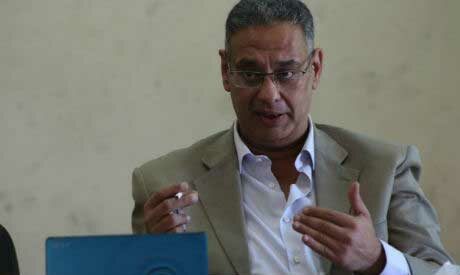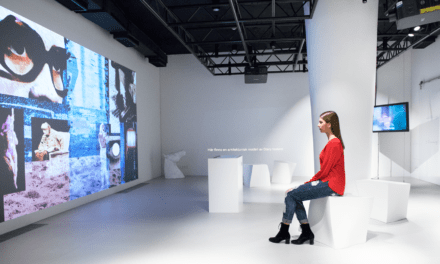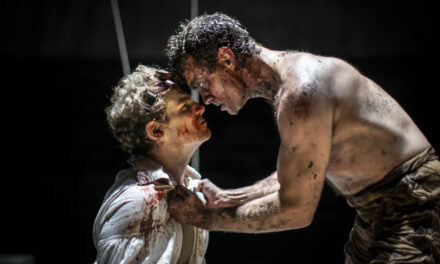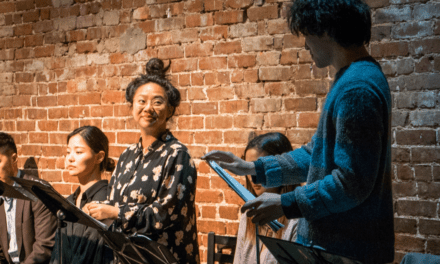Alaa Abdel Aziz, president of the Alexandria Arab Theatre Festival for Specialised Institutes and Colleges, shared his views on the inaugural edition, mission and plans ahead.
When I met Alaa Abdel Aziz, president of the Alexandria Arab Theatre Festival for Specialised Institutes and Colleges, he seemed overwhelmed, yet happy and filled with passion dealing with the many tasks related to his role in the new festival that takes place 3-8 December in Alexandria.
Lecturer at the Higher Institute of Theatrical Arts in Cairo and a playwright, Abdel Aziz is a well-established theatrical figure in Egypt.
The festival he presides over is one of his dreams, borne of years of reflection —both his and that of his many colleagues — on the importance of such an event.
“The festival’s idea should be credited to Professor Ashraf Zaki (head of the Theatre Institute) though we were all very excited about launching it, so as to underscore the importance of academic studies in the theatre field,” Abdel Aziz explained to Ahram Online, adding that the many years he spent in the UK contributed to shaping of his ideas about theatre studies and the rivalry that exists between academia and the talents who choose to explore this art away from specialized institutions.
As such, the festival aims at supporting the students choosing to follow the academic path — whether in art academies or within the artistic departments of many colleges — as well as to encourage others to consider this journey, whether confined within academic walls or outside.
“To become a theatre artist — or any artist for that matter — there is no obligation to study it in an academic way; however, being an apprentice to some professors who have experience and knowledge in the field saves you time and effort,” Abdel Aziz commented.
In today’s dynamics of art, many young people do not find academia an important component of their development. Abdel Aziz says:
“Academia is to be blamed for that in some part. I do not deny that there is an element of arrogance within academic circles. However, while at times one side excludes the other, there is no one formula for learning and practicing art. What matters is that you make good art.”
Abdel Aziz adds, however, that academia offers a selection of professors many of whom are pioneers in their specializations, while some studied and practiced art on the international scene. In this context, being in contact with such persons in one’s own country is beneficial and an opportunity to absorb their experience, whether practical or theoretical.
“Academia works in different ways, not only inside buildings. Theatre practitioners work all around the cities,” Abdel Aziz clarified, swiftly adding that while embracing all young practitioners is important, he strongly disagrees with the idea that academia spoils or destroys natural artistic sensitivity.
As such, among the festival’s aims is to create a bridge between both groups and to ease the ongoing conflict of ideas around art in theory and practice. “This year we run the first edition. Our strategy is a long-term one, and it will take a few editions to see fruits of our work,” Abdel Aziz asserted.
The choice of Alexandria to host the festival was not random, as Abdel Aziz explained.
“Alexandria used to be a multicultural city and in some ways it still is. There is something special about it. On the other hand, recently we have launched a branch of Cairo’s Higher Institute for Theatrical Arts in Alexandria, not to forget the much older department of theatre studies at Alexandria University. The festival complements those efforts of bringing the city closer to the art of theatre.”
“In comparison with Cairo, Alexandria has very few theatre plays staged for local audience while the festival brings this art form to them. For many years some theatre troupes premiered their performances in Alexandria before performing in Cairo; it is like a test for their success. The festival redirects this thinking as well.”
Since the festival embraces students from theatre specialized academies and departments, the presence of young talent on stage and young people in the audience is truly impressive.
“Not only the festival is about young people as actors or directors, but we also include young people in many tasks related to the festival. Many students are involved in organizational tasks of the festival,” Abdel Aziz explained, pointing to Mohamed Abdel Aziz, a student from Alexandria’s branch of Higher Institute for Theatrical Arts, who holds the festival director position while being in charge of many crucial tasks related to the event’s execution.
“I enjoy working on and within this festival. I also learned a lot throughout the whole journey. I learn from young people. I also learn new aspects of organization and management,” Abdel Aziz added, mentioning that until now his main preoccupation was related to his work as a lecturer and playwright.
The festival’s first edition hosts 10 troupes, hailing from Egypt and a few Arab countries. The ambitious plans of management include incorporating international theatre practitioners as well in future editions.
“We are aware that going international is a difficult task and will need more financial support, but as we are still at the beginning of that road, we are positive. Already this year, the festival has been generously supported by many institutions and sponsors. We are supported in hotel matters, publication, transportation, etc. We thank Dr. Ines Abdel Dayem, minister of culture, Dr. Ashraf Zaki, head of the Theatre Academy in Cairo, Dr. Mostafa El-Fiki, head of the Bibliotheca Alexandrina, Alexandria governorate, and many other partners.”
With positive feedback about the festival so far, Abdel Aziz is optimistic about the festival’s future. He concludes our meeting saying,“ Dreams remain dreams until people are capable of realizing them.” With the first edition of this ambitious endeavor and the response of the audience, the festival has potential to create interesting changes on Egypt’s cultural map.
This article was originally posted at http://english.ahram.org.eg on December 8, 2019, and has been reposted with permission. To read the original article, click here.
This post was written by the author in their personal capacity.The opinions expressed in this article are the author’s own and do not reflect the view of The Theatre Times, their staff or collaborators.
This post was written by Ati Metwaly.
The views expressed here belong to the author and do not necessarily reflect our views and opinions.


















